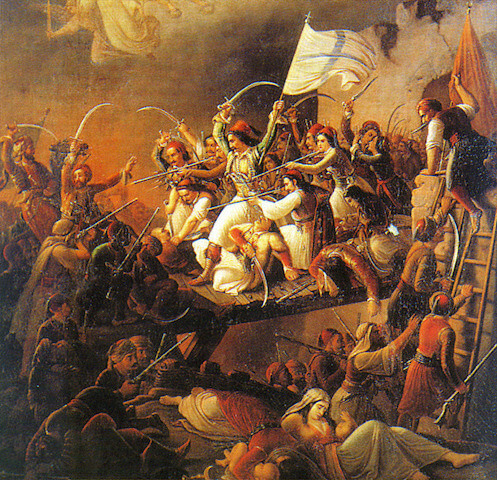Updated February 9, 2023
Summary of the Greek War of Independence
(Image Credit: Greek Reporter)
The Greek Struggle for Independence(1821-1829), also known as the Greek Revolution, was a victorious war fought by the Greeks to gain independence from the Ottoman Empire. After a long and violent fight, and with the assistance of the Great Powers, freedom was ultimately given in July 1832 by the Treaty of Constantinople. As a result, the Greeks became the first subject peoples of the Ottoman Empire to gain recognition as an independent sovereign state.
What led to the Greek war?
- The Philik Etairea, a patriotic conspiracy created in Odessa (now in Ukraine) in 1814, was the catalyst for the insurrection. By that time, the desire for independence was widespread among Greeks of all social groups, whose Hellenism, or sense of Greek identity, had long been promoted by the Greek Orthodox Church, the preservation of the Greek language, and the Ottoman Empire’s administrative systems.
- Their economic success and the influence of Western revolutionary ideologies fueled their Hellenism even more.
- Alexandros Ypsilantis, the organization’s leader, crossed the Pruthos River on February 22, 1821, signaling the start of the revolution.
- Ypsilantis publicly announced the revolution in Iasion, and Georgakis Olympios rushed to join him (February 26).
- Kantakouzenos took over leadership of the “Sacred Band,” which consisted of 500 young pupils, for the subsequent fundraising, which raised one million groschen. On March 17, Ypsilantis hoisted the Greek flag in Bucharest, the capital of Wallachia.
The aftermath of the war
- The effects were uncertain in the immediate aftermath of the Greek revolution. A Greek autonomous state had developed, but Britain, Russia, and France later claimed extensive involvement in Greek affairs and the importation of a Bavarian dynasty as monarch and a foreign army.
- The nation had been affected by ten years of conflict, was overrun with displaced refugees, and was littered with vacant Turkish estates, forcing a series of land reforms spanning several decades.
- The new state also comprised fewer than one-third of the Ottoman Empire’s two-and-a-half million Greek inhabitants. For much of the next century, the Greek state was to pursue the freedom of the Ottoman Empire’s “unredeemed” Greeks to reunify all Greeks in one country.
- Armenians largely replaced Greeks in banking and merchanting in Constantinople and most of the Ottoman Empire, while Bulgarian merchants gained prominence.
Significant facts about the Greek war
There are several important facts about the Greek War of Independence. Some of them are listed below.
1. The people of Mani started the war
The people of Mani declared war on the Ottoman Empire on March 17, 1821. This war occurred roughly a week before the rest of Greece started a war on March 25, 1821. Most of Greece was motivated to join the cause when Mani declared war.
2. The Sacred Band Played an Important Role in the Revolution
The Sacred Band, a patriotic organization, is often credited with sparking the Greek revolution. The Filiki Eteria, known in Greek, was founded in 1814. Numbers were selected when it initially started. However, in the months leading up to the war, the number of people rose significantly. It is one of the main reasons why the uprising spread throughout Greece.
3. Theodoros Kolokotronis Was a Key General
Theodoros Kolokotronis was an influential commander in several battles and triumphs during the Greek War of Independence. He was much more than a general and a people’s leader. With his bravery, he encouraged the Greeks and played a significant role in Greece’s freedom.
4. The Siege of Tripolitsa resulted in Victory
The Siege of Tripolitsa was a struggle that lasted from April to September 1821. Although the Greeks finally won the siege, also occurred a terrible bloodbath in which many people died. General Kolokotronis focused on capturing control of Tripolitsa, the final point of the Ottoman struggle in the area after Greek revolutionaries had taken control of much of southern and central Greece. The Greeks were finally victorious after a lengthy battle.
Conclusion
Between 1821 to 1829, Greek revolutionaries launched a successful independence struggle against the Ottoman Empire. West European powers such as France, the United Kingdom, and the Russian Empire surrounded the Greeks, while poets and painters valued Greece as the birthplace of European culture. Finally, the Treaty of Constantinople recognized Greece as an independent nation in 1832.
Recommended Articles
We hope that this EDUCBA information on “Greek War of Independence” was beneficial to you. You can view EDUCBA’s recommended articles for more information,



